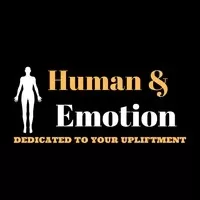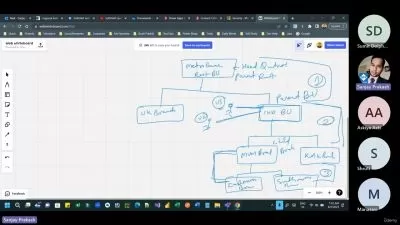Certification in Customer Relationship Management (CRM)
Human and Emotion: CHRMI
6:45:45
Description
Effectively manage and enhance relationships with customers with Process, Case Study, Example & Complete Implementation
What You'll Learn?
- Understand the fundamentals of CRM and its importance in modern business practices.
- Explore various CRM strategies and approaches tailored to different industries and customer segments.
- Learn how to select, implement, and manage CRM software and technology solutions effectively.
- Analyze customer data and leverage it to make informed business decisions and enhance customer interactions.
- Develop skills in designing and executing CRM campaigns to acquire, retain, and upsell customers.
- Explore best practices for measuring and evaluating the success of CRM initiatives.
- Understand the ethical considerations and privacy concerns related to CRM and customer data management.
Who is this for?
What You Need to Know?
More details
DescriptionA Customer Relationship Management (CRM) online course is designed to provide individuals with the knowledge and skills needed to effectively manage and enhance relationships with customers. CRM is a critical business strategy that focuses on building and maintaining strong customer relationships to drive customer satisfaction, loyalty, and business growth. Below is a typical course description for an online CRM course:
Course Title: Customer Relationship Management (CRM) Online Course
Course Description:
This Customer Relationship Management (CRM) online course is designed to equip students with the essential concepts, strategies, and tools needed to create, manage, and optimize customer relationships in a digital age. In today's highly competitive business environment, organizations must understand the importance of nurturing long-term customer relationships and delivering exceptional customer experiences.
Course Format:
This online CRM course typically includes video lectures, readings, quizzes, assignments, case studies, and discussions. Participants may also have access to CRM software for hands-on experience.
Prerequisites:
There are typically no specific prerequisites for this course, although a basic understanding of business concepts and marketing principles can be beneficial.
By the end of this CRM online course, students should be equipped with the knowledge and skills needed to effectively implement CRM strategies, leverage customer data, and drive customer-centric growth within their organizations.
Why CRM
Customer Relationship Management (CRM) is a strategic approach that involves managing and nurturing relationships with customers throughout their journey with a business. The CRM process typically consists of several key stages:
· Customer Identification: This is the first step in the CRM process. It involves identifying potential customers and capturing relevant information about them. This information may include contact details, demographics, preferences, and purchase history.
· Customer Acquisition: Once potential customers are identified, the next step is to acquire them as actual customers. This can involve various marketing and sales strategies, such as advertising, lead generation, and sales outreach.
· Customer Onboarding: After acquiring new customers, it's essential to ensure a smooth onboarding process. This includes providing them with the necessary information, training, and support to get started with your products or services.
· Customer Engagement: Engaging with customers is a continuous process. This stage involves building and maintaining relationships by providing value, addressing questions or concerns, and delivering exceptional customer service. It can include personalized marketing, communication, and support.
· Data Collection and Analysis: Throughout the customer journey, data is collected about customer interactions, behaviors, and preferences. This data is then analyzed to gain insights into customer needs, trends, and opportunities for improvement.
· Segmentation: Based on the analysis of customer data, customers are often segmented into different groups or categories. This segmentation helps tailor marketing and communication efforts to specific customer segments, increasing relevance and effectiveness.
· Customer Retention: Retaining existing customers is often more cost-effective than acquiring new ones. CRM focuses on strategies to keep customers satisfied and loyal. This can involve loyalty programs, personalized offers, and ongoing support.
· Cross-Selling and Upselling: CRM strategies also aim to maximize customer value by identifying opportunities to sell additional products or services to existing customers. This can be done by recommending complementary products or upgrades.
· Feedback and Improvement: Gathering feedback from customers is crucial for continuous improvement. This can be done through surveys, reviews, and direct communication. Feedback is used to enhance products, services, and the overall customer experience.
· Measurement and KPIs: Key Performance Indicators (KPIs) are used to assess the effectiveness of CRM efforts. Common KPIs include customer satisfaction scores, customer lifetime value, retention rates, and conversion rates.
· Automation and Technology: Many businesses use CRM software and technology to automate various aspects of the CRM process. This can include email marketing automation, customer support ticketing systems, and data analytics tools.
· Customer Loyalty and Advocacy: In the long term, CRM aims to turn satisfied customers into loyal advocates who promote your brand to others. Building strong customer relationships can lead to referrals and positive word-of-mouth marketing.
· Feedback Loop: The CRM process should be cyclical, with insights from customer interactions feeding back into the process to drive continuous improvement.
Effective CRM requires a holistic and customer-centric approach that involves multiple departments within an organization, including marketing, sales, customer support, and product development. It's about building and maintaining long-lasting relationships that benefit both the customer and the business.
Curriculum of CRM
Introduction
1. CRM
2. Scope of CRM
3. Evaluation of CRM
4. TPA
5. Customer value
CRM Types and Components
6. CRM components
7. Analytical, Collaborative CRM
8. CRM technology components
9. Customer value
10. CSV
Customer and Consumer
11. Customer Profitability
12. Consumer complaints
13. Customer retention ,acquisition, expectation
Contd..
14. Negative and Positive retention
Different Processes and Methods
15. Closed loop marketing
16. 360 marketing
17. Hierarchical methods
18. Decision trees
Decision trees contd
19. Cross selling and up selling
20. Customer relationship technology
21. Front office management
22. Job analysis and job description
23. The art of supervising
ECRM and ERP
24. Ecrm
25. Challenges of Ecrm
26. Key CRM features
27. ERP and CRM
28. SCM and CRM
29. Barriers to internet adoption
Customer Profiling
30. Managing customer relationship
31. Email marketing data
32. Social media
33. Customer experience management
34. Customer experience
35. Customer profile
36. STP
37. Repositioning
38. Delivering customer offer
Strategy and Framework
39. CRM strategy
40. Customer system life cycle
41. Building blocks of CRM
42. CRM measurement
43. Balanced score
44. Customer privacy
45. Privacy
46. Need for legislation
Data Management
47. Data protection and verification
Data protection and verification contd
48. Data collection
49. Data Processing
50. Data storage
51. Privacy a global approach
52. Markets in privacy
53. Data banks
54. Personal information
Automation
55. Critical success factors
56. Sales automation
57. Benefits of Sales force automation
Case Study
Different CRM software and details
Step by step detailed process to Implement CRM
Templates and Formats used in CRM
Who this course is for:
- Effective CRM requires a holistic and customer-centric approach that involves multiple departments within an organization, including marketing, sales, customer support, and product development.
- Anyone interested in Sales, Customer Relation, Marketing and Business
A Customer Relationship Management (CRM) online course is designed to provide individuals with the knowledge and skills needed to effectively manage and enhance relationships with customers. CRM is a critical business strategy that focuses on building and maintaining strong customer relationships to drive customer satisfaction, loyalty, and business growth. Below is a typical course description for an online CRM course:
Course Title: Customer Relationship Management (CRM) Online Course
Course Description:
This Customer Relationship Management (CRM) online course is designed to equip students with the essential concepts, strategies, and tools needed to create, manage, and optimize customer relationships in a digital age. In today's highly competitive business environment, organizations must understand the importance of nurturing long-term customer relationships and delivering exceptional customer experiences.
Course Format:
This online CRM course typically includes video lectures, readings, quizzes, assignments, case studies, and discussions. Participants may also have access to CRM software for hands-on experience.
Prerequisites:
There are typically no specific prerequisites for this course, although a basic understanding of business concepts and marketing principles can be beneficial.
By the end of this CRM online course, students should be equipped with the knowledge and skills needed to effectively implement CRM strategies, leverage customer data, and drive customer-centric growth within their organizations.
Why CRM
Customer Relationship Management (CRM) is a strategic approach that involves managing and nurturing relationships with customers throughout their journey with a business. The CRM process typically consists of several key stages:
· Customer Identification: This is the first step in the CRM process. It involves identifying potential customers and capturing relevant information about them. This information may include contact details, demographics, preferences, and purchase history.
· Customer Acquisition: Once potential customers are identified, the next step is to acquire them as actual customers. This can involve various marketing and sales strategies, such as advertising, lead generation, and sales outreach.
· Customer Onboarding: After acquiring new customers, it's essential to ensure a smooth onboarding process. This includes providing them with the necessary information, training, and support to get started with your products or services.
· Customer Engagement: Engaging with customers is a continuous process. This stage involves building and maintaining relationships by providing value, addressing questions or concerns, and delivering exceptional customer service. It can include personalized marketing, communication, and support.
· Data Collection and Analysis: Throughout the customer journey, data is collected about customer interactions, behaviors, and preferences. This data is then analyzed to gain insights into customer needs, trends, and opportunities for improvement.
· Segmentation: Based on the analysis of customer data, customers are often segmented into different groups or categories. This segmentation helps tailor marketing and communication efforts to specific customer segments, increasing relevance and effectiveness.
· Customer Retention: Retaining existing customers is often more cost-effective than acquiring new ones. CRM focuses on strategies to keep customers satisfied and loyal. This can involve loyalty programs, personalized offers, and ongoing support.
· Cross-Selling and Upselling: CRM strategies also aim to maximize customer value by identifying opportunities to sell additional products or services to existing customers. This can be done by recommending complementary products or upgrades.
· Feedback and Improvement: Gathering feedback from customers is crucial for continuous improvement. This can be done through surveys, reviews, and direct communication. Feedback is used to enhance products, services, and the overall customer experience.
· Measurement and KPIs: Key Performance Indicators (KPIs) are used to assess the effectiveness of CRM efforts. Common KPIs include customer satisfaction scores, customer lifetime value, retention rates, and conversion rates.
· Automation and Technology: Many businesses use CRM software and technology to automate various aspects of the CRM process. This can include email marketing automation, customer support ticketing systems, and data analytics tools.
· Customer Loyalty and Advocacy: In the long term, CRM aims to turn satisfied customers into loyal advocates who promote your brand to others. Building strong customer relationships can lead to referrals and positive word-of-mouth marketing.
· Feedback Loop: The CRM process should be cyclical, with insights from customer interactions feeding back into the process to drive continuous improvement.
Effective CRM requires a holistic and customer-centric approach that involves multiple departments within an organization, including marketing, sales, customer support, and product development. It's about building and maintaining long-lasting relationships that benefit both the customer and the business.
Curriculum of CRM
Introduction
1. CRM
2. Scope of CRM
3. Evaluation of CRM
4. TPA
5. Customer value
CRM Types and Components
6. CRM components
7. Analytical, Collaborative CRM
8. CRM technology components
9. Customer value
10. CSV
Customer and Consumer
11. Customer Profitability
12. Consumer complaints
13. Customer retention ,acquisition, expectation
Contd..
14. Negative and Positive retention
Different Processes and Methods
15. Closed loop marketing
16. 360 marketing
17. Hierarchical methods
18. Decision trees
Decision trees contd
19. Cross selling and up selling
20. Customer relationship technology
21. Front office management
22. Job analysis and job description
23. The art of supervising
ECRM and ERP
24. Ecrm
25. Challenges of Ecrm
26. Key CRM features
27. ERP and CRM
28. SCM and CRM
29. Barriers to internet adoption
Customer Profiling
30. Managing customer relationship
31. Email marketing data
32. Social media
33. Customer experience management
34. Customer experience
35. Customer profile
36. STP
37. Repositioning
38. Delivering customer offer
Strategy and Framework
39. CRM strategy
40. Customer system life cycle
41. Building blocks of CRM
42. CRM measurement
43. Balanced score
44. Customer privacy
45. Privacy
46. Need for legislation
Data Management
47. Data protection and verification
Data protection and verification contd
48. Data collection
49. Data Processing
50. Data storage
51. Privacy a global approach
52. Markets in privacy
53. Data banks
54. Personal information
Automation
55. Critical success factors
56. Sales automation
57. Benefits of Sales force automation
Case Study
Different CRM software and details
Step by step detailed process to Implement CRM
Templates and Formats used in CRM
Who this course is for:
- Effective CRM requires a holistic and customer-centric approach that involves multiple departments within an organization, including marketing, sales, customer support, and product development.
- Anyone interested in Sales, Customer Relation, Marketing and Business
User Reviews
Rating
Human and Emotion: CHRMI
Instructor's Courses
Udemy
View courses Udemy- language english
- Training sessions 60
- duration 6:45:45
- Release Date 2024/01/03










